Volcanoes
Volcanoes are openings in the Earth's surface through which molten rock, ash, and gases are ejected. They can be found on land and under the ocean. Volcanic eruptions can have a significant impact on the environment, climate, and human societies.
Types of Volcanoes
There are several types of volcanoes:
- Shield Volcanoes: These are broad, gently sloping volcanoes built by the eruption of low-viscosity lava. They are characterized by their large size and relatively low explosivity.
- Stratovolcanoes: Also known as composite volcanoes, these are tall, steep-sided volcanoes built by the eruption of viscous lava and ash. They are known for their explosive eruptions.
- Cinder Cone Volcanoes: These are the smallest type of volcano, typically built from the eruption of pyroclastic material such as ash, cinders, and bombs.
- Calderas: These are large, basin-shaped depressions formed by the collapse of a volcano after a massive eruption or the emptying of a magma chamber beneath it.
Volcanic Eruptions
Volcanic eruptions can take various forms:
- Lava Flows: Streams of molten rock that flow from a volcanic vent.
- Pyroclastic Flows: Swift-moving, ground-hugging avalanches of hot ash, rock fragments, and volcanic gas.
- Volcanic Gases: These include water vapor, carbon dioxide, sulfur dioxide, and other gases released during eruptions.
- Volcanic Ash: Fine particles of fragmented volcanic rock and glass that can be carried high into the atmosphere by eruption plumes.
Study Guide
To study volcanoes, consider the following topics:
- What causes volcanic eruptions?
- How are different types of volcanoes formed?
- What are the effects of volcanic eruptions on the environment and climate?
- How do scientists monitor and predict volcanic activity?
- What are the historical impacts of volcanic eruptions on human societies?
Additionally, it would be helpful to study specific examples of famous volcanic eruptions, such as the eruption of Mount Vesuvius in 79 AD or the 1980 eruption of Mount St. Helens.
By understanding the different types of volcanoes, the mechanisms of volcanic eruptions, and their impacts, you can gain a comprehensive understanding of this fascinating geological phenomenon.
[Volcanoes] Related Worksheets and Study Guides:
.◂Science Worksheets and Study Guides Seventh Grade. Ecosystems, food chains and food webs
Study Guide Ecosystems, food chains and food webs
Ecosystems, food chains and food webs  Activity Lesson
Activity Lesson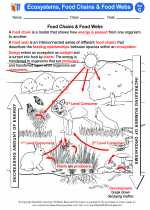 Ecosystems, Food Chains & Food Webs
Ecosystems, Food Chains & Food Webs  Worksheet/Answer key
Worksheet/Answer key Ecosystems, food chains and food webs
Ecosystems, food chains and food webs  Worksheet/Answer key
Worksheet/Answer key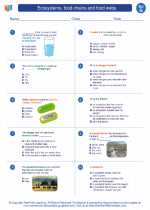 Ecosystems, food chains and food webs
Ecosystems, food chains and food webs  Worksheet/Answer key
Worksheet/Answer key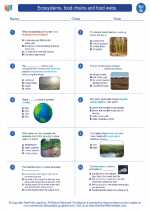 Ecosystems, food chains and food webs
Ecosystems, food chains and food webs  Vocabulary/Answer key
Vocabulary/Answer key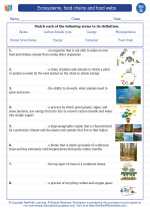 Ecosystems, food chains and food webs
Ecosystems, food chains and food webs  Vocabulary/Answer key
Vocabulary/Answer key Ecosystems, food chains and food webs
Ecosystems, food chains and food webs  Vocabulary/Answer key
Vocabulary/Answer key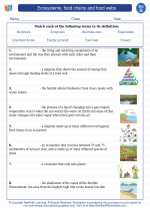 Ecosystems, food chains and food webs
Ecosystems, food chains and food webs  Vocabulary/Answer key
Vocabulary/Answer key Ecosystems, food chains and food webs
Ecosystems, food chains and food webs  Vocabulary/Answer key
Vocabulary/Answer key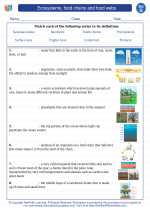 Ecosystems, food chains and food webs
Ecosystems, food chains and food webs 

 Activity Lesson
Activity Lesson
 Worksheet/Answer key
Worksheet/Answer key
 Worksheet/Answer key
Worksheet/Answer key
 Worksheet/Answer key
Worksheet/Answer key
 Vocabulary/Answer key
Vocabulary/Answer key
 Vocabulary/Answer key
Vocabulary/Answer key
 Vocabulary/Answer key
Vocabulary/Answer key
 Vocabulary/Answer key
Vocabulary/Answer key
 Vocabulary/Answer key
Vocabulary/Answer key

The resources above cover the following skills:
LIFE SCIENCE
Ecosystems: Interactions, Energy, and Dynamics
Examine the cycling of matter between abiotic and biotic parts of ecosystems to explain the flow of energy and the conservation of matter.
Analyze and interpret data to provide evidence regarding how resource availability impacts individual organisms as well as populations of organisms within an ecosystem.
Construct an explanation to predict patterns of interactions in different ecosystems in terms of the relationships between and among organisms (e.g., competition, predation, mutualism, commensalism, parasitism).
Engage in argument to defend the effectiveness of a design solution that maintains biodiversity and ecosystem services (e.g., using scientific, economic, and social considerations regarding purifying water, recycling nutrients, preventing soil erosion).